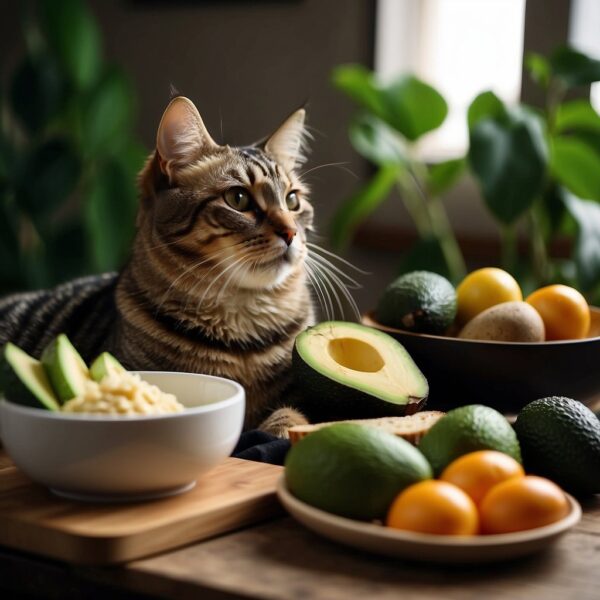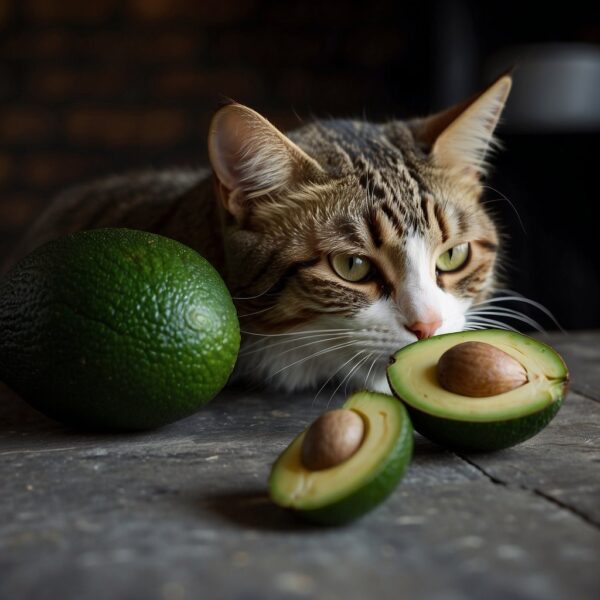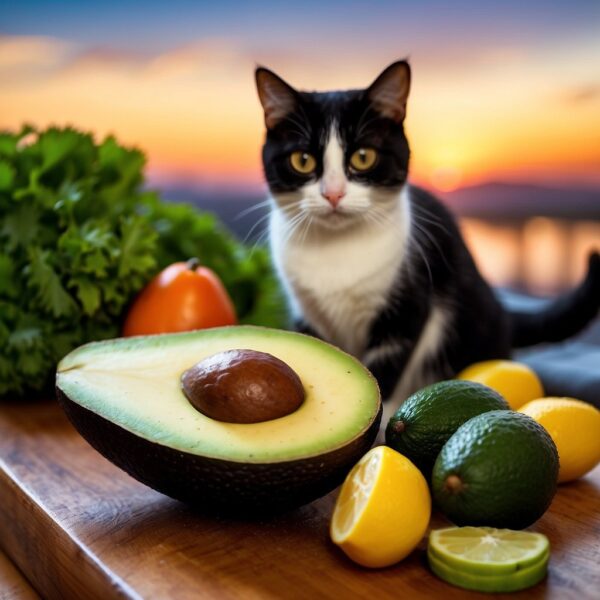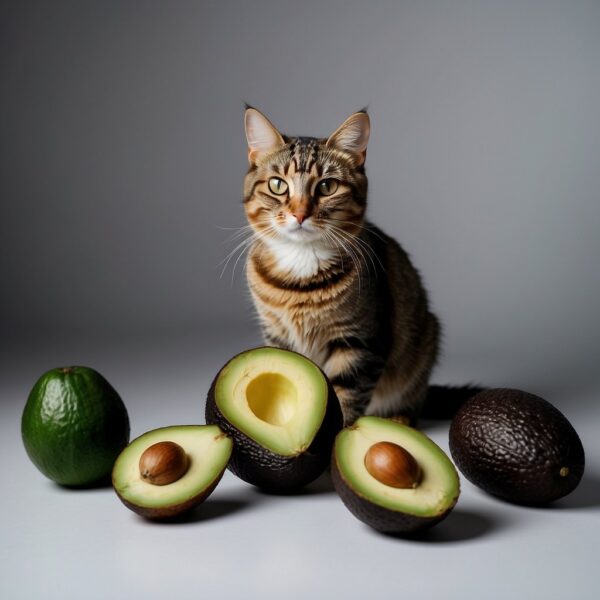
Cats and Avocados: Health Risk to cats
When it comes to feline nutrition and safety, the conversation about if cats can eat avocado is multifaceted. Avocado is a food item commonly found in households, celebrated for its health benefits to humans. However, the effects on cats are not as straightforward. While some parts of the avocado like the flesh may be non-toxic, other components of the fruit could be harmful.
The main concern with feeding avocado to cats lies in the substance called persin. This toxin, present in the avocado plant, can be detrimental to certain animals, including cats. Cats are obligate carnivores, meaning that their diet requires nutrients found primarily in meat; hence, the high fat content in avocados can also lead to health issues such as pancreatitis.
In small, controlled amounts, the flesh of the avocado might not be immediately harmful to cats, yet caution is highly advised. Guardians need to consider the appropriate portions and ensure that other parts of the avocado, such as the pit and skin, are inaccessible to their pets due to toxicity risks. Governance over feeding cats foods like avocado is necessary when comparing it to their usual dietary needs and the potential risks involved.
Key Takeaways
- Not all parts of the avocado are safe for cats, and caution is advised.
- Persin presence in avocados can pose health risks to cats.
- Appropriate portions, if any, should be very small and monitored closely.
Nutritional Profile of Avocado
Avocados are nutrient-dense fruits known for their healthy fats and rich vitamin content. They offer a unique combination of benefits and risks when considering their inclusion in a cat’s diet.
Richness in Healthy Fats
Avocados are abundant in monounsaturated fats, specifically oleic acid, which is beneficial for heart health. The high content of healthy fats in avocados also contributes to the absorption of other fat-soluble vitamins.
Vitamins and Minerals Content
This fruit is a good source of vitamins such as Vitamin K, Vitamin E, Vitamin C, and certain B vitamins (B-5, B-6), as well as minerals like potassium. Avocados contain more potassium than bananas, which is vital for maintaining electrical gradients in the body’s cells.
Possible Health Benefits of Avocado for Cats
Fiber in avocados can aid in digestion for cats. The antioxidants and vitamins could hypothetically contribute to a shiny coat and support the immune system. However, these health benefits are outweighed by the risks associated with the other contents of avocados for cats.
cats and avocado: Risks and Toxicity of Avocado
Avocado contains persin, a fungicidal toxin that can cause toxic effects in animals. While not lethal, consumption of avocado can lead to avocado poisoning in cats, which includes symptoms like gastrointestinal discomfort. Additionally, the high fat content may lead to stomach upset or pancreatitis in felines.

The Dangers of Persin to Cats Eating Avocado
The ingestion of persin, a toxin found in avocados, can lead to a range of health issues for cats. This substance is particularly harmful to many animals and causes symptoms of poisoning that cat owners should be aware of.
Symptoms of Persin Poisoning in Cats Eating Avocado
When cats consume persin, it may cause gastrointestinal upset, which often presents as vomiting and diarrhea. Owners may also observe less specific signs of poisoning such as lethargy or swelling. While not usually life-threatening, these symptoms warrant immediate attention from a veterinarian to provide supportive care.
- Vomiting: An immediate reaction that can occur after ingestion.
- Diarrhea: May follow or occur along with vomiting, indicating irritation of the gastrointestinal tract.
- Lethargy: Cats may appear tired or less responsive.
Persin Concentration in Avocado Parts
Different parts of the avocado contain varying levels of persin, which affects the degree of toxicity.
- Leaves and Bark: These parts of the avocado tree have a higher concentration of persin.
- Seed (Pit): The avocado pit also contains persin and poses a risk of physical obstruction if swallowed.
- Skin: The skin has less persin compared to the leaves and bark but can still be toxic to cats.
- Stem: Like the skin, the stem also holds some amount of persin.
| Avocado Part | Persin Concentration | Hazard Level for Cats |
|---|---|---|
| Leaves, Bark | High | Highly Toxic |
| Seed (Pit) | Moderate-High | Toxic, Risk of Obstruction |
| Skin | Moderate | Toxic to Cats |
| Stem | Moderate | Potentially Toxic |
Cat owners should ensure avocados and their parts remain out of their pets’ reach to prevent accidental ingestion.
Can Cats Eat Avocado? Yes, But not worth the risk
Cats can have avocado flesh as a treat but in very small amounts due to its high fat content. Avocado provides healthy monounsaturated and polyunsaturated fats that can support coat and skin health. However, since a cat’s diet is primarily meat-based, which provides them with the necessary nutrition, avocado should only be an occasional treat. To ensure safety, follow these guidelines:
- Portion Size: Give cats no more than a small piece of avocado flesh, roughly the size of a dice, to prevent excessive caloric intake.
- Frequency: Offer avocado treats sparingly, not more than once a week.
Risks of Choking and Internal Blockages
Although the avocado’s flesh can be safe in small quantities, other parts of the fruit pose significant hazards:
- Pit: The large avocado seed is a choking hazard and can cause an obstruction if ingested.
- Plant Material: All other parts of the avocado plant, including the skin and leaves, contain a substance called persin, which can be toxic to cats in large amounts.
To prevent any risk of choking or internal blockage:
- Always remove the pit and skin from the avocado before offering any to a cat.
- Ensure that the small piece of avocado flesh is mashable between your fingers to reduce the risk of choking.
Keeping these safety measures in mind allows cats to enjoy avocado as a safe and healthy treat when served properly and in moderation.

Comparison with Other Household Foods
When considering the inclusion of household foods like avocado in a cat’s diet, it is essential to compare its nutritional attributes and potential risks against other fruits and vegetables that owners might consider sharing with their feline friends.
Avocado Vs. Other Fruits and Vegetables
Avocados contain dietary fiber, vitamins, and healthy fats that may contribute positively to a cat’s health in moderation. However, they differ from other common fruits and vegetables in a few significant ways:
- Citrus fruits (like oranges and lemons), grapes, and raisins are highly toxic to cats and can cause kidney damage or failure.
- Vegetables, such as onions and garlic, whether raw, cooked, or in powder form, can cause gastrointestinal irritation and lead to red blood cell damage.
- Avocados do not pose the same level of toxicity, but the pit, peel, and leaves contain persin, which is harmful to some animals, though the fruit’s flesh is generally considered safe for cats in small quantities.
| Food Item | Consideration for Cats |
|---|---|
| Avocado | Safe in moderation, avoid pit, peel, and leaves |
| Other vegetables | Generally safe, but avoid onions and garlic |
| Other fruits | Many are toxic; citrus, grapes and raisins are unsafe |
Recognizing Unsafe Foods for Cats
The safety of a cat’s diet hinges on the recognition of toxic foods. Several common household items pose a risk:
- Onions and garlic contain sulfoxides and disulfides, which can lead to anemia in cats.
- Tomatoes and the leaves and stems of potato plants can cause gastrointestinal upset.
- Anything with caffeine or chocolate is dangerous due to substances like theobromine and caffeine that cats cannot metabolize.
Owners should contact the Pet Poison Helpline or consult with a veterinarian if they are unsure about the safety of a particular food.
Impact of Foods Like Avocado on a Cat’s Diet
Avocado, if offered, should merely be an occasional treat and not a staple due to its calorie and fat content, which could contribute to obesity and diabetes if fed in large amounts. Comparatively, commercial cat food is specifically formulated for a balanced feline diet that provides all the necessary nutrients without the risks associated with many household foods. Cats have different nutritional requirements from humans, and foods safe for human consumption can be misleading indicators of safety for pets.
| Nutrient | Concern for Cats |
|---|---|
| Sugar | Can lead to obesity and diabetes |
| Carbohydrates | Cats have limited carbohydrate needs |
| Saturated Fat | High levels increase obesity risk |
In conclusion, a guardian should always prioritize cat-specific items but can offer certain human foods with care and knowledge of their safety profile.

Cats and Avocados: Frequently Asked Questions
This section addresses common concerns about cats and avocado consumption, clarifying safety measures and identifying safe dietary practices for felines.
What should I do if my cat eats avocado?
If a cat ingests avocado, one should monitor the animal for any signs of discomfort or illness. Immediate veterinary attention may be necessary, especially if the cat exhibits symptoms like vomiting or diarrhea.
Is avocado oil safe for feline consumption?
Avocado oil is generally considered safe for cats in small quantities. However, it is recommended to use it sparingly due to the high fat content, which can be difficult for cats to digest.
Are any avocado parts toxic to cats?
The leaves, pit, and skin of the avocado contain Persin, a fungicidal toxin, which can be harmful to cats if ingested. The flesh of the avocado is less toxic but can still pose risks in large amounts.
What are the signs of avocado poisoning in cats?
Signs of avocado poisoning in cats include vomiting, diarrhea, and myocardial damage. If a cat has consumed avocado and is showing these symptoms, they should be taken to a veterinarian immediately.
Which fruits are safe for cats to eat?
Fruits such as blueberries, apples (without seeds), and melons can be safe for cats when given in moderation. Always avoid grapes and raisins, as they are toxic to cats.
How does a cat eating avocado affect Their health?
Avocado consumption can lead to gastrointestinal upset in cats. While small amounts of the flesh may not be immediately harmful, its high-fat content can contribute to pancreatitis and obesity over time.